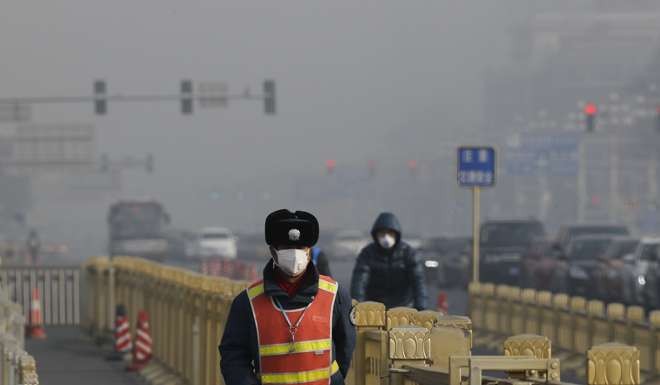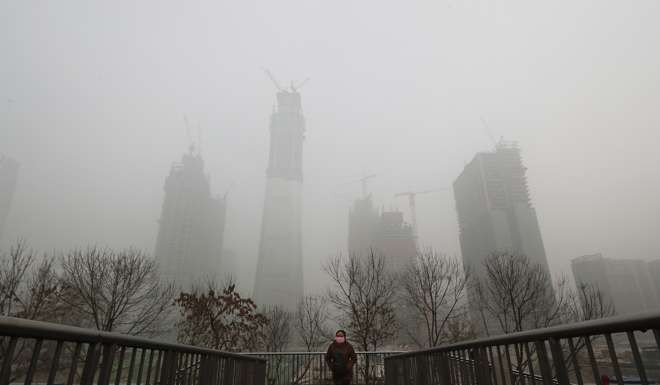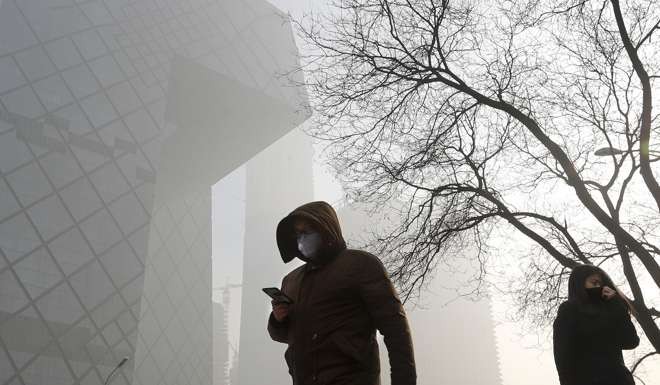Beijing start-ups move out as hazardous smog smothers capital
New survey reveals around half of nearly 300 entrepreneurs polled have thought about moving their whole, or parts of their business out of the city because of the appalling air conditions

Beijing issued its highest “red” fog alert for a second day running on Wednesday, after weeks of choking winter pollution, and experts are now warning the conditions are starting to have a serious effect on not only attracting new talent and entrepreneurs to the capital, but forcing more to relocate.
A latest survey by 36kr.com, a Beijing-based online platform providing tech start-up news and services revealed around half of nearly 300 entrepreneurs polled have thought about moving their businesses or part of their operation out of the city because of the appalling air conditions – though only 4 per cent have already made actual plans.
Cities in developed eastern and southern China, where the economy is thriving and pollution is less frequent and less severe, are starting to emerge as more popular choices for tech experts and start-ups, it said.
Nearly a quarter of respondents would chose to move to Hangzhou, home to Alibaba Group Holdings, followed by Shenzhen’s 23.23 per cent and Shanghai’s 13.13 per cent. Alibaba is owner of the South China Morning Post.
Beijing-based entrepreneur Gu Jun, for instance, told the Post he has begun 2017 by busily planning to relocate his business.

“I am at an age when I am wanting to settle my family, too. But this smog engulfing the city is doing our health no good, and this grey air triggers all kinds of negative feelings, which are the last thing already stressed-out entrepreneurs like myself want,” said the 26-year-old, who founded Need, a mobile e-commerce start-up there in 2014.
Gu has spent nine years in Beijing since starting college there, and says it offers many advantages when setting up a business, including government support, a wide talent pool, and a healthy community of venture capitalists.
As home to many growing global tech giants, including ride-hailing major Didi Chuxing and smartphone markers Xiaomi and Lenovo – both of which are gradually eating into the shares of market leaders Apple and Samsung Electronics – Beijing is still attractive to many entrepreneurs given its political clout, readily available financial support and funding options.
Uber Technologies chief Travis Kalanick recently predicted he expects there to be “more innovation, more invention and more entrepreneurship happening in China, happening in Beijing than in Silicon Valley”.

But the smothering smog currently enveloping the city is now emerging as a major threat to its appeal for young and growing businesses, which may shift the tech universe’s centre of gravity elsewhere.
Some 53 per cent of the survey respondents said they want to stay put in Beijing because the city is “irreplaceable in terms of market and resources,” according to 36kr.com, invested by Alibaba’s affiliate Ant Financial.
Wendy Mu, managing partner of ManPower Group China, a human resources consulting firm providing headhunting services, says she has already started witnessing growing interest among candidates willing to relocate to other cities, because of its pollution-laden skies.
“We help companies find candidates with five to 15 years of working experience in the tech sector,” said the Shanghai-based Mu.
“In previous years, around three out of 10 candidates we called were interested in relocation. But since last year, that’s risen to six out of 10, who are open for relocation and the poor air quality in Beijing is an important reason.”

“But now for the health of their kids, they are more willing to move to other cities,” she said.
David Zhang, founding managing partner of Matrix Partners China, a consultancy which helps entrepreneurs build what it calls “significant, industry-leading companies”, even recently claimed working in Beijing “is worth the sacrifice of years in life”.
Gu Jun says he has been to Shanghai, Hangzhou and Suzhou in search of suitable premises, and has tentatively decided to move his business to the third city, after the Chinese Spring Festival. Four of his 10-strong team have agreed to join him.
“I’ve done the maths. I can save a third of human resources costs and half of office costs in Suzhou. I expect other perks, as other local governments in China decide to offer incentives to attract more businesses, such as tax cuts for start-ups,” he said.

He admits that finding the right talent and getting funding might be a challenge in his new base, which is about 50 minutes from Shanghai by bullet train.
“But as more like-minded people flee from smoggy Beijing, the problems will solve themselves in the long run,” he said.
Robin Li, the billionaire chief executive of Beijing-based Baidu told the World Internet Forum in Wuzhen in November that Silicon Valley entrepreneurs put off by a Donald Trump presidency are welcomed to set up shop in China.
“I read that an advisor to President-elect Donald Trump complained that three-quarters of engineers in Silicon Valley aren’t Americans,” Li told the audience. “So I myself hope that many of these engineers will come to China to work for us.”
Earlier in the year, however, a report by the Global Cities Business Alliance – a UK-based not-for-profit organisation – also named the Chinese capital as having the world’s least-affordable rental housing, according to a survey of 15 global cities, with average prices more than 1.2 times average salaries.
Soaring house prices, which rose around 18 per cent in the year to March, and restrictions on non-residents buying houses until they have paid tax in Beijing for five years, make renting the only option for many of the city’s young adults and migrant workers, the report said.
Another survey, by consulting group Mercer, named the Chinese capital as the tenth most-expensive city for expatriates, ahead of New York at eleventh, and London at seventeenth. Tokyo was fifth, Shanghai seventh and Beijing tenth.